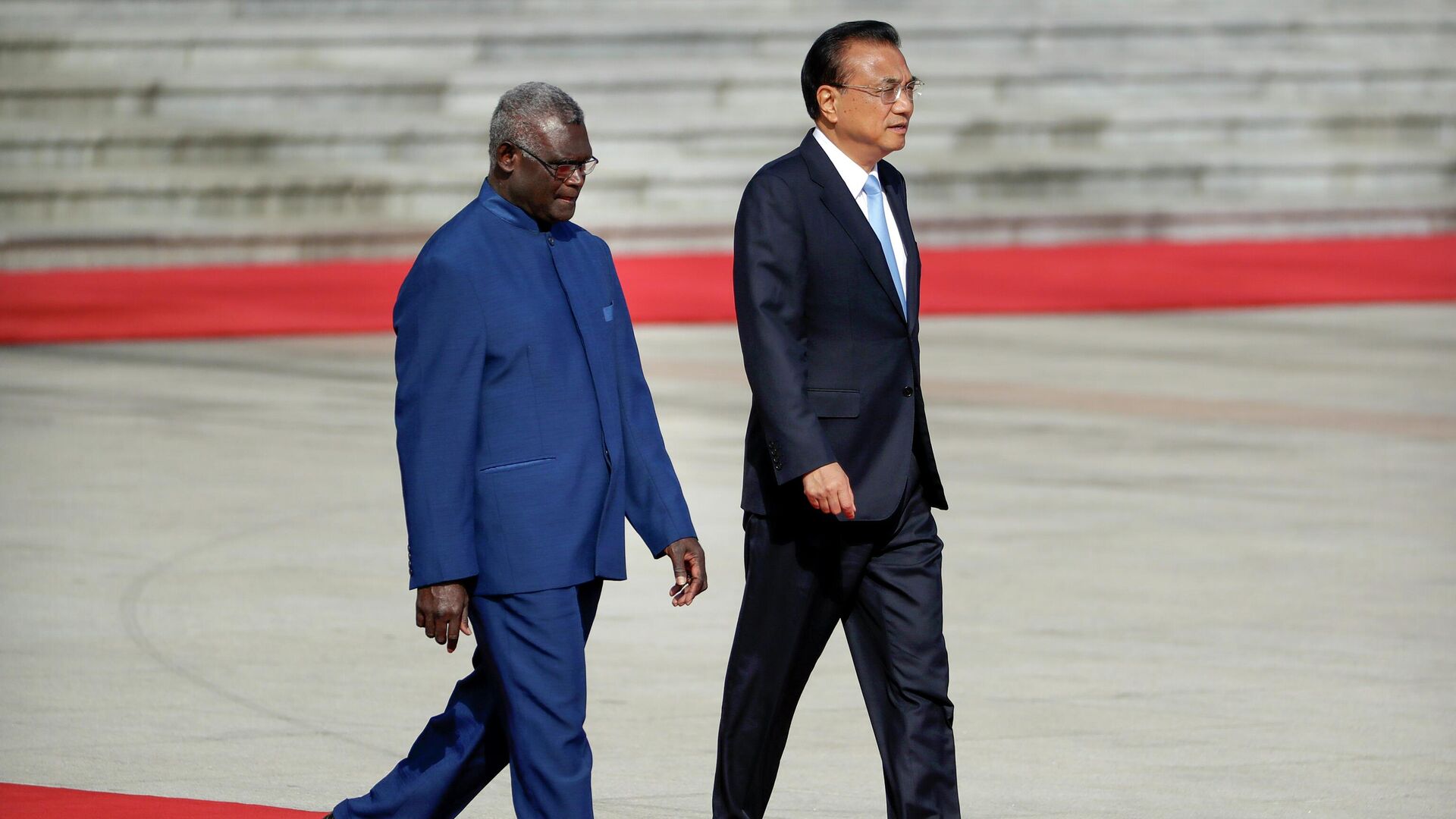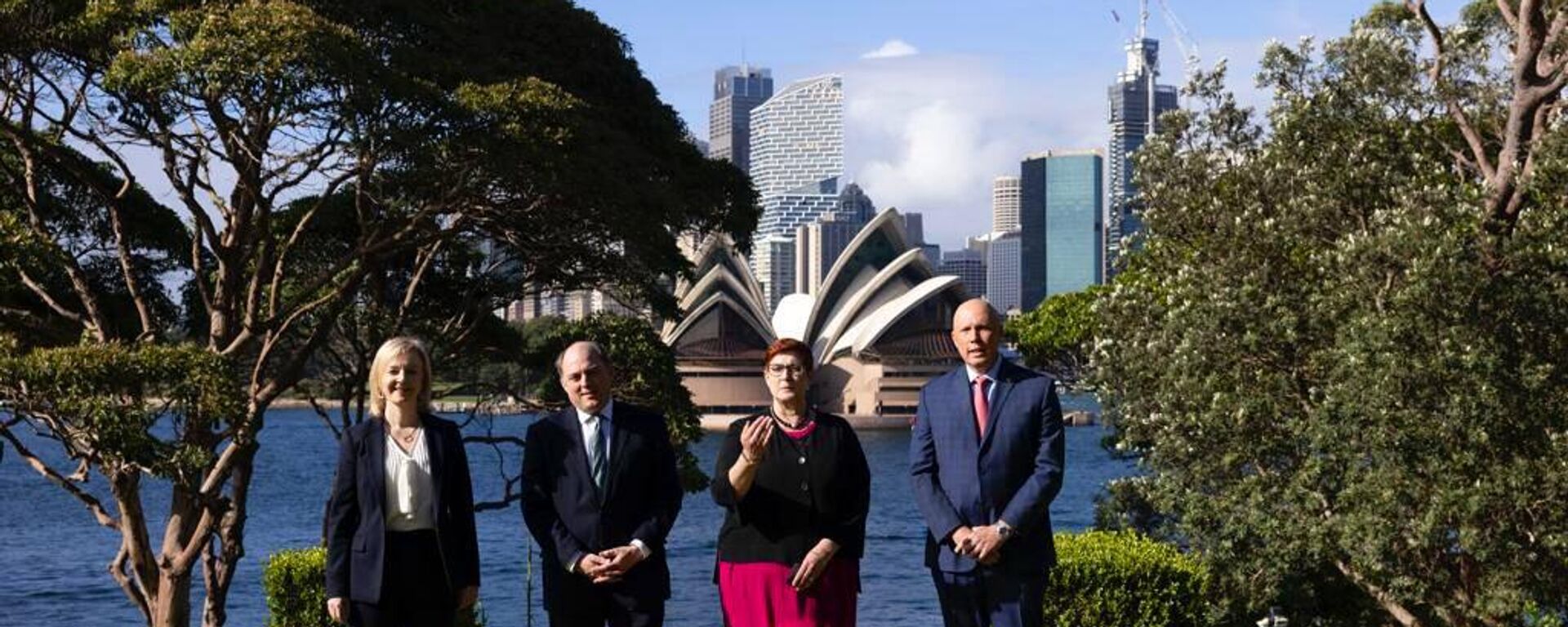https://sputnikglobe.com/20220506/australia-calls-solomon-islands-hostile-after-pm-slams-wests-glaring-hypocrisy-over-china-deal-1095300579.html
Australia Calls Solomon Islands ‘Hostile’ After PM Slams West’s ‘Glaring Hypocrisy’ Over China Deal
Australia Calls Solomon Islands ‘Hostile’ After PM Slams West’s ‘Glaring Hypocrisy’ Over China Deal
Sputnik International
Prime Minister Scott Morrison attempted to paper over his government’s concerns about its small island neighbor after an unspecified Australian official... 06.05.2022, Sputnik International
2022-05-06T03:00+0000
2022-05-06T03:00+0000
2022-05-06T03:00+0000
solomon islands
australia
china
security agreement
military base
https://cdn1.img.sputnikglobe.com/img/07e6/05/06/1095300554_0:0:3071:1728_1920x0_80_0_0_0141d66b52a364c1ac04a231c30630d1.jpg
Solomon Islands Prime Minister Manasseh Sogavare’s fierce denunciation of the West’s “glaring hypocrisy” regarding an impending security treaty with China was met with indignation by Canberra, it was reported Wednesday. Citing an unnamed official, Australia’s ABC news says the Morrison government claims to ‘fear’ Sogavare ‘is becoming increasingly autocratic and hostile to Australia after signing a security pact with China.’The antagonistic rhetoric from Canberra comes just days after the Solomon Islands PM denounced before Parliament as “totally unacceptable” a threat of invasion recently published by an influential Australian outlet. Sogavare went on to say that it was “insulting” that the government of the Solomon Islands was “being treated as kindergarten students walking around with Colt 45s in [their] hands,” who “therefore… need to be supervised” by its ostensible Western allies.It appears his appeal may have fallen on deaf ears, however. Australian Prime Minister Scott Morrison claimed Thursday that “none of” the imperialistic behavior alleged by the Solomon Islands’ head of state “is true.” Instead, Morrison insisted, “in Australia,” Sogavare “finds a good friend.”Some doubt the sincerity of the comments, which come just a week after Australia warned the Solomon Islands that constructing a Chinese military base would mean the country had crossed a “red line.” It’s an eventuality that Sogavare notes has never been on the table, but it wasn’t just Canberra that downplayed the threat of potential military action while simultaneously hyping it up. US officials warned in an official late April visit that any attempt to build a base alongside China would be met with an unspecified ‘response.’ Since a draft version of the agreement was mysteriously leaked to the press in February, virtually every other Five Eyes nation has lined up to denounce the pact.The Chinese Foreign Ministry later struck back at the campaign of “disinformation, defamation, coercion and intimidation" from the West, describing such tactics as proof that countries like Australia are still "obsessed with colonialist myths, exercising coercive diplomacy, trying hard to control the Pacific islands to maintain a so-called sphere of influence."On Wednesday, a spokesperson for the Australian Foreign Ministry claimed that the country is "deeply committed" to the Pacific."We respond in times of need,” like the “civil unrest of the kind that took place in the Solomon Islands late last year," they insisted. That period of unrest–which left at least three dead and resulted in the Chinatown district of the nation’s capital being razed to the ground–has been likened to a coup attempt by a number of outside observers. But the prime minister debunked Australia’s official narrative before the Solomon Islands Parliament Monday, explaining that the Australian prime minister’s personal envoy previously “outlined in no uncertain terms” that Australian forces deployed to combat the November 2021 unrest on the island were “‘not here to protect Chinese built infrastructures, China's businesses, the Chinese Embassy and [would] not act as bodyguards for members of parliament.'”
https://sputnikglobe.com/20220425/australia-calls-for-war-readiness-as-solomon-china-pact-triggers-tensions-in-pacific-1095027765.html
solomon islands
australia
china
Sputnik International
feedback@sputniknews.com
+74956456601
MIA „Rossiya Segodnya“
2022
News
en_EN
Sputnik International
feedback@sputniknews.com
+74956456601
MIA „Rossiya Segodnya“
Sputnik International
feedback@sputniknews.com
+74956456601
MIA „Rossiya Segodnya“
solomon islands, australia, china, security agreement, military base
solomon islands, australia, china, security agreement, military base
Australia Calls Solomon Islands ‘Hostile’ After PM Slams West’s ‘Glaring Hypocrisy’ Over China Deal
Prime Minister Scott Morrison attempted to paper over his government’s concerns about its small island neighbor after an unspecified Australian official accused the Solomon Islands of becoming ‘increasingly hostile’ following its entry into a much-maligned security agreement with China.
Solomon Islands Prime Minister Manasseh Sogavare’s fierce denunciation of the West’s “glaring hypocrisy” regarding an impending security treaty with China was met with indignation by Canberra, it was reported Wednesday.
Citing an unnamed official,
Australia’s ABC news says the Morrison government claims to ‘fear’ Sogavare ‘is becoming increasingly autocratic and hostile to Australia after signing a security pact with China.’
The antagonistic rhetoric from Canberra comes just days after the Solomon Islands PM denounced before Parliament as “totally unacceptable” a threat of invasion recently published by an influential Australian outlet. Sogavare
went on to say that it was “insulting” that the government of the Solomon Islands was “being treated as kindergarten students walking around with Colt 45s in [their] hands,” who “therefore… need to be supervised” by its ostensible Western allies.
“We do not have to be warned… to be aware of the working out of their strategy,” Sogavare explained, “in other parts of the world where small and big sovereign countries were either invaded or they covertly undermine the sitting government.” The aggressive actions by Western powers are taking place, the PM noted, because certain parties decline to “come to terms with the principle of 'Do unto others as you would have them do unto you.’”
It appears his appeal may have fallen on deaf ears, however. Australian Prime Minister Scott Morrison
claimed Thursday that “none of” the imperialistic behavior alleged by the Solomon Islands’ head of state “is true.” Instead, Morrison insisted, “in Australia,” Sogavare “finds a good friend.”
Some doubt the sincerity of the comments, which come just a week after Australia warned the Solomon Islands that
constructing a Chinese military base would mean the country had crossed a “red line.” It’s an eventuality that Sogavare notes has never been on the table, but it wasn’t just Canberra that downplayed the threat of potential military action while simultaneously hyping it up. US officials warned in an official late April visit that any attempt to build a base alongside China
would be met with an unspecified ‘response.’ Since a draft version of the agreement was mysteriously leaked to the press in February, virtually every other Five Eyes nation has lined up to denounce the pact.
The Chinese Foreign Ministry later struck back at the campaign of “disinformation, defamation, coercion and intimidation" from the West, describing such tactics as proof that countries like Australia are still "obsessed with colonialist myths, exercising coercive diplomacy, trying hard to control the Pacific islands to maintain a so-called sphere of influence."
On Wednesday, a spokesperson for the Australian Foreign Ministry claimed that the country is "deeply committed" to the Pacific.
"We respond in times of need,” like the “civil unrest of the kind that took place in the Solomon Islands late last year," they insisted. That period of unrest–which left at least three dead and resulted in the Chinatown district of the nation’s capital being razed to the ground–has been likened to a coup attempt by a number of outside observers.
But the prime minister debunked Australia’s official narrative before the Solomon Islands Parliament Monday, explaining that the Australian prime minister’s personal envoy previously “outlined in no uncertain terms” that Australian forces deployed to combat the November 2021 unrest on the island were “‘not here to protect Chinese built infrastructures, China's businesses, the Chinese Embassy and [would] not act as bodyguards for members of parliament.'”
“In other words, they will not protect members of Parliament,” Sogavare noted. “That got us thinking. Mr. Speaker: 'if they are not here to do all of that, then what are they here to do,' Mr. Speaker?”


